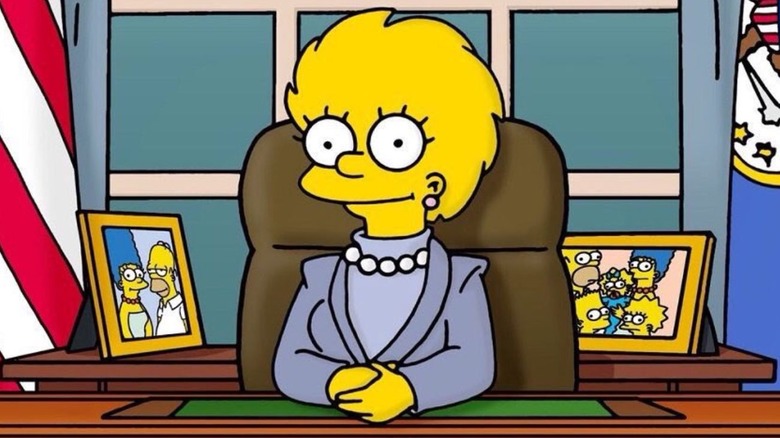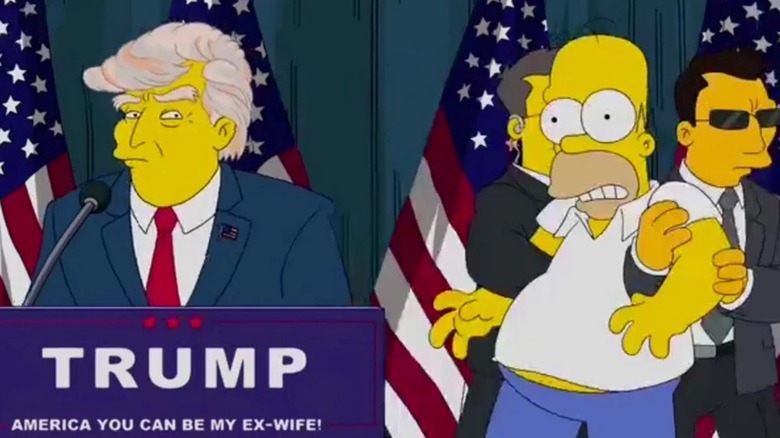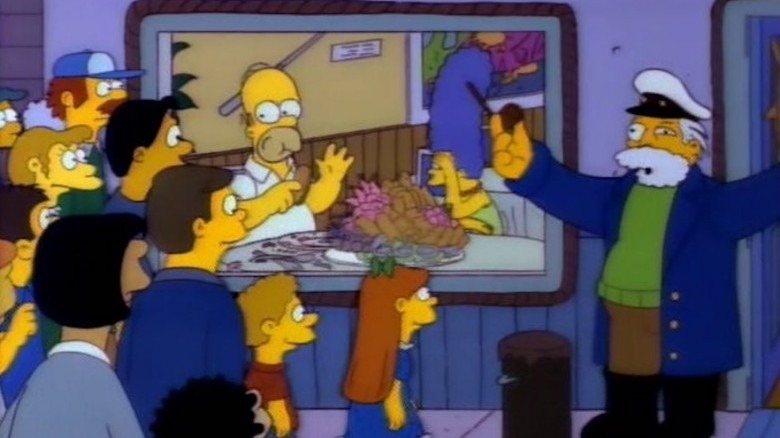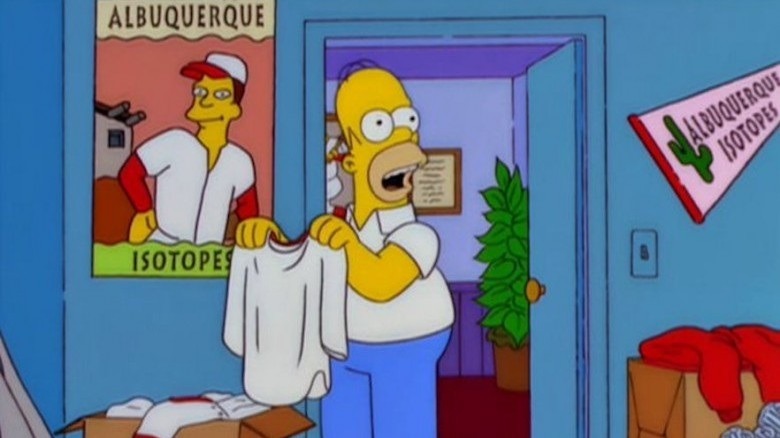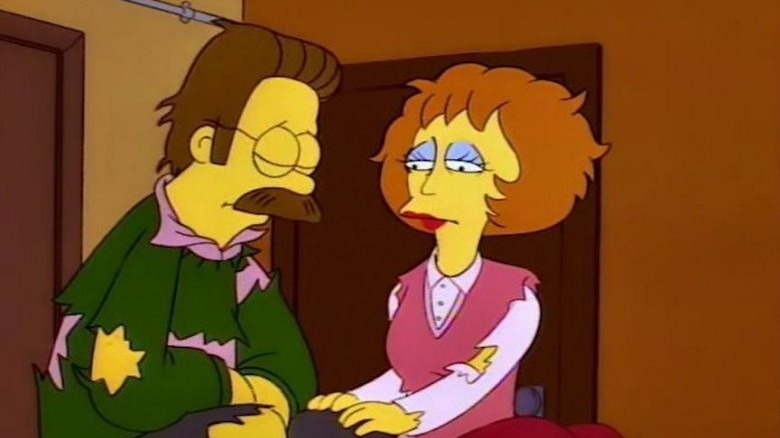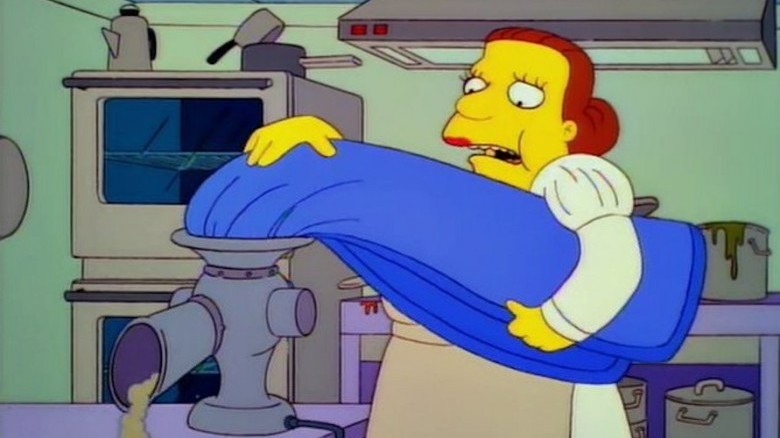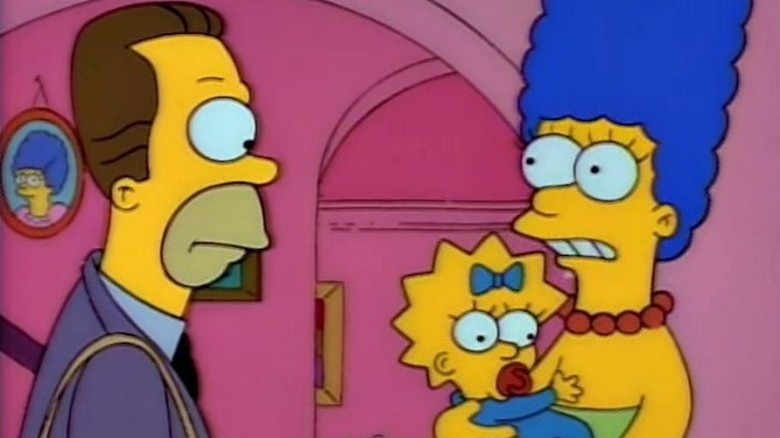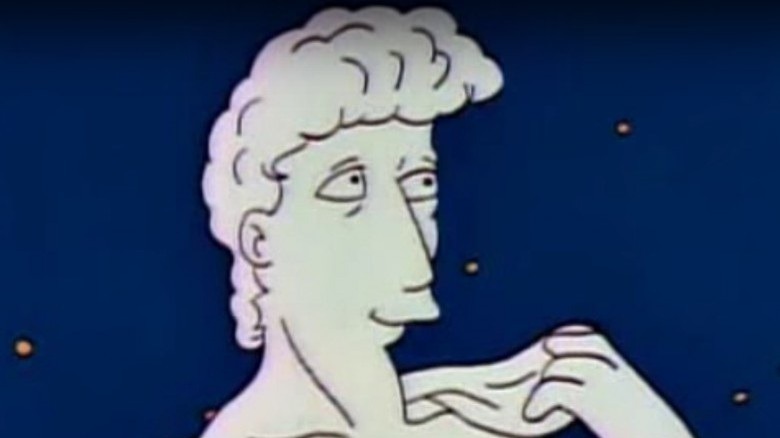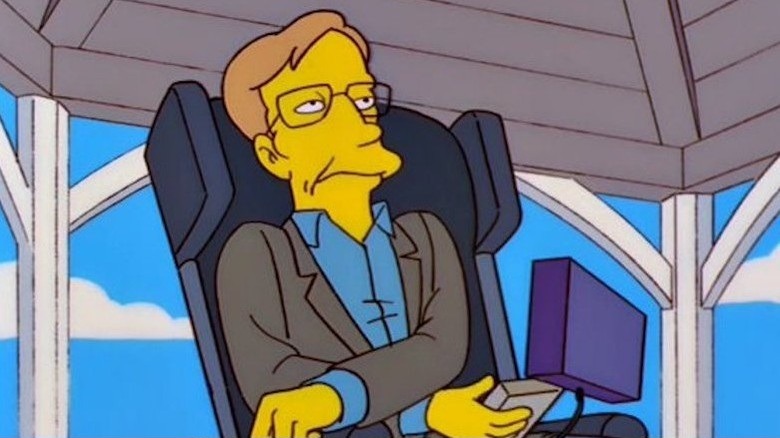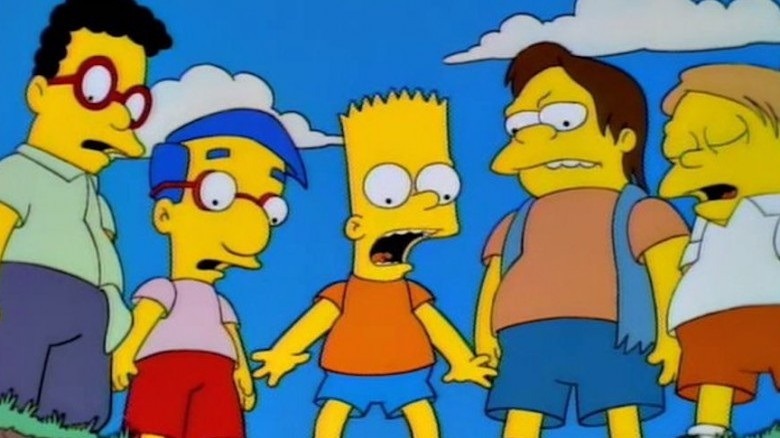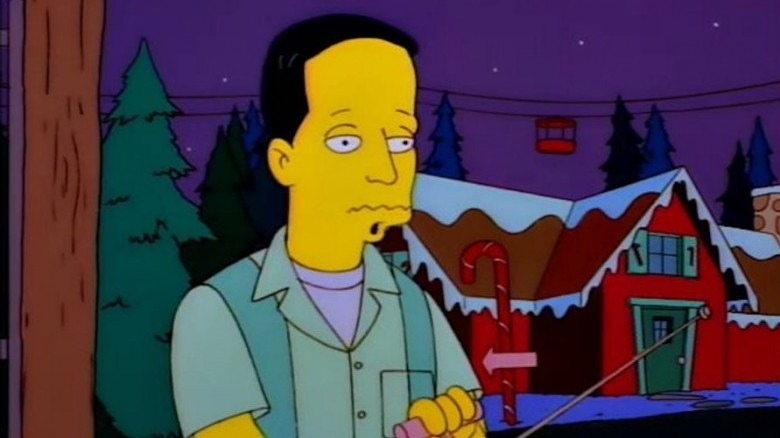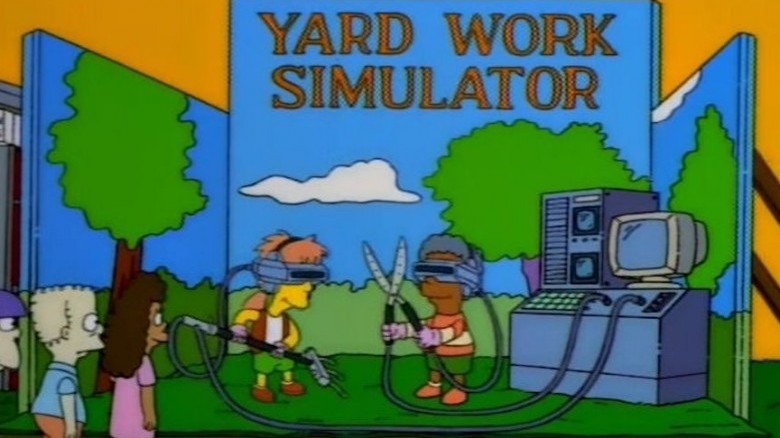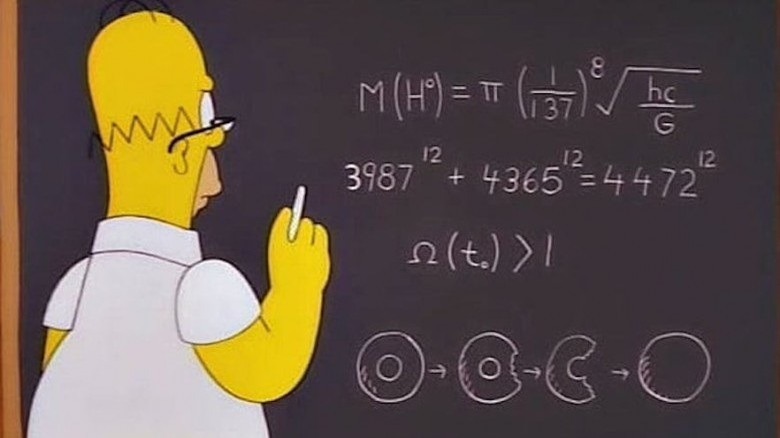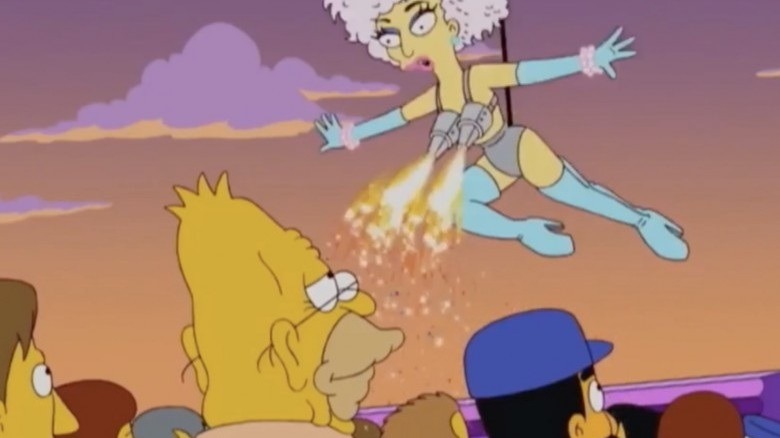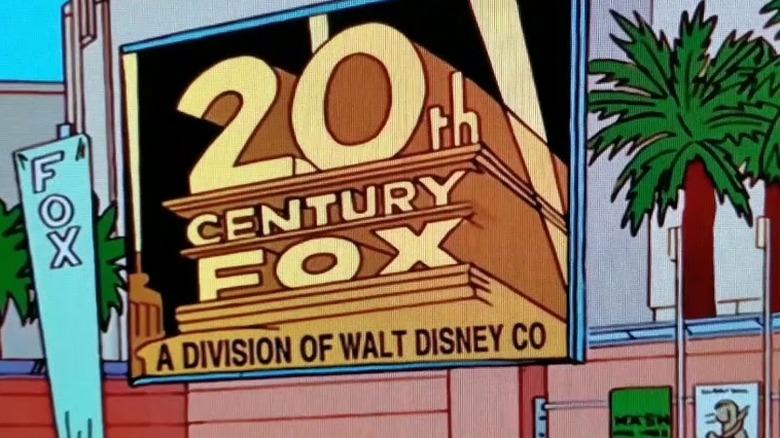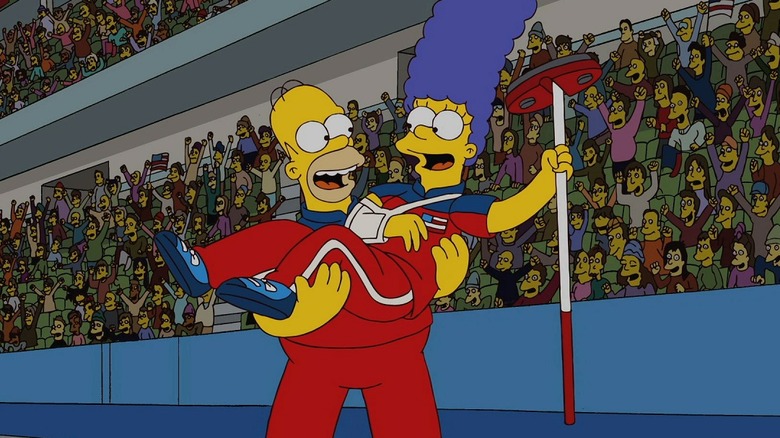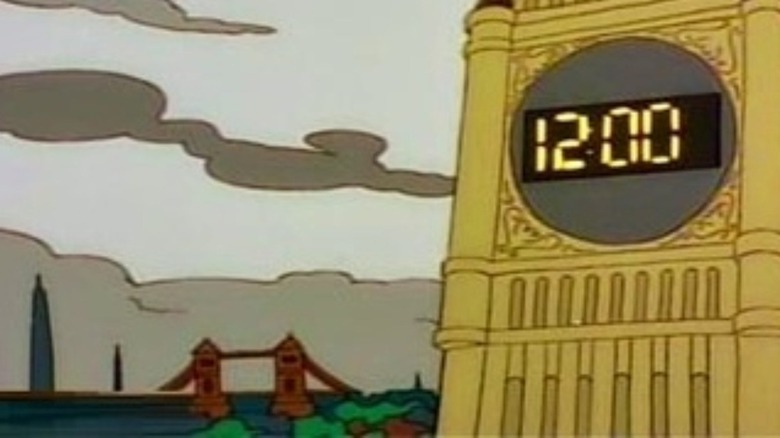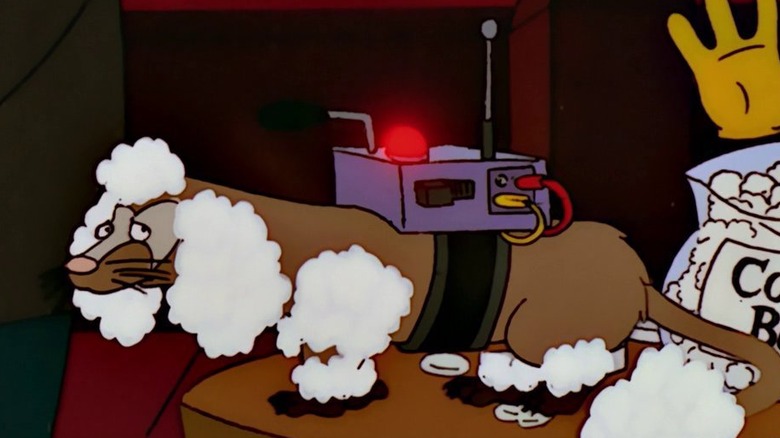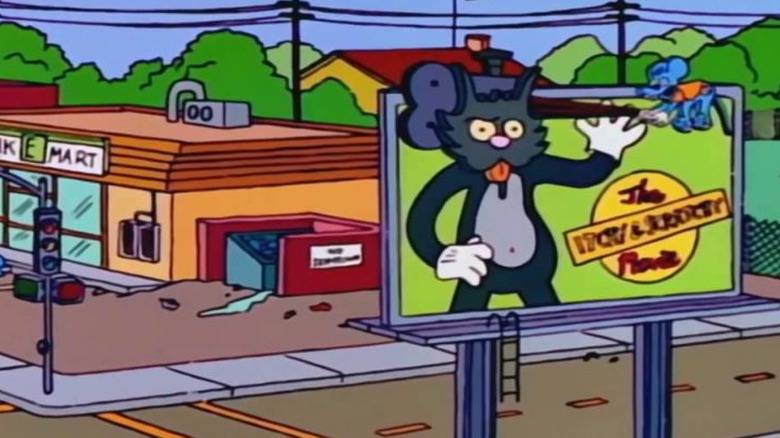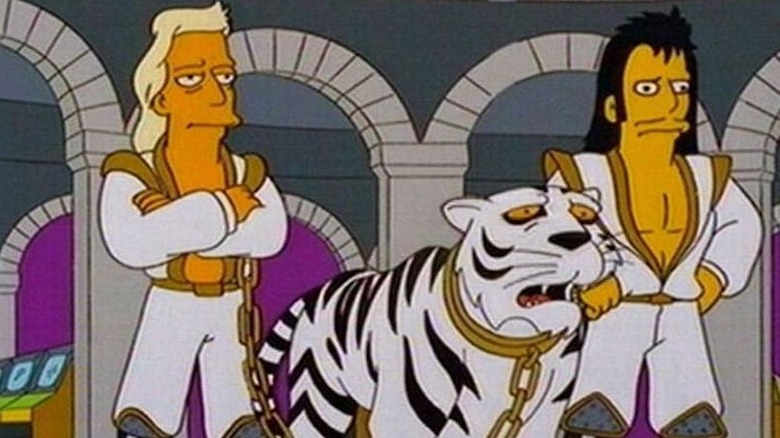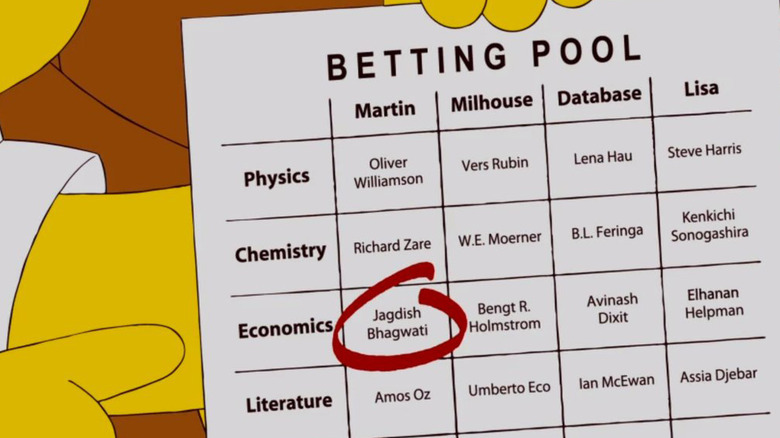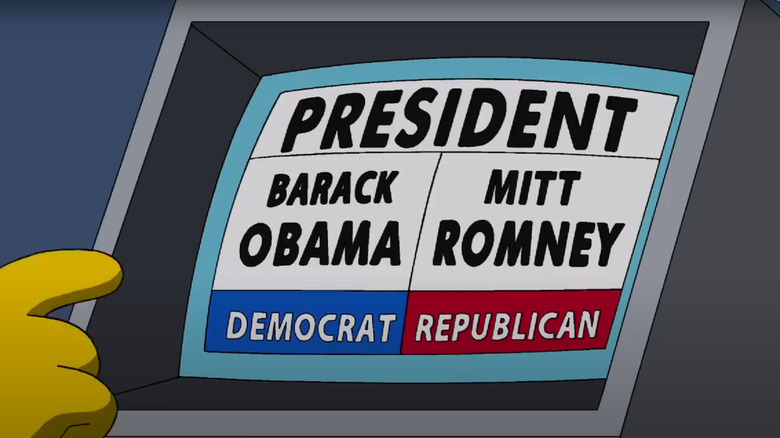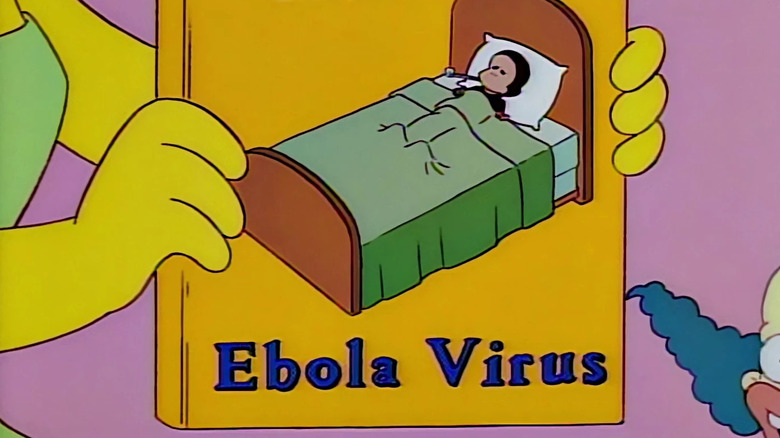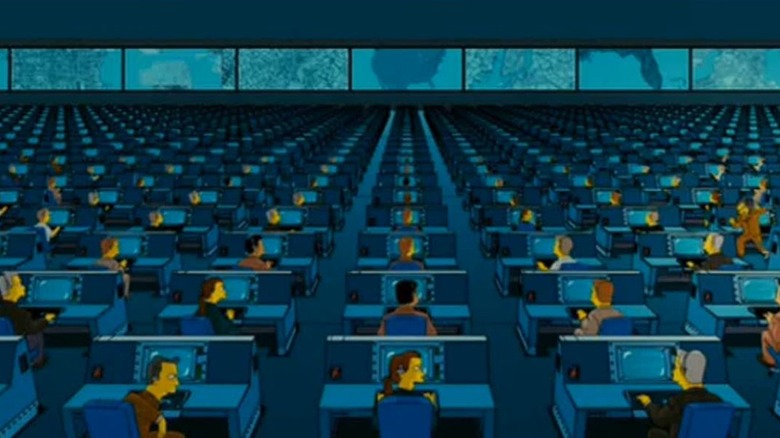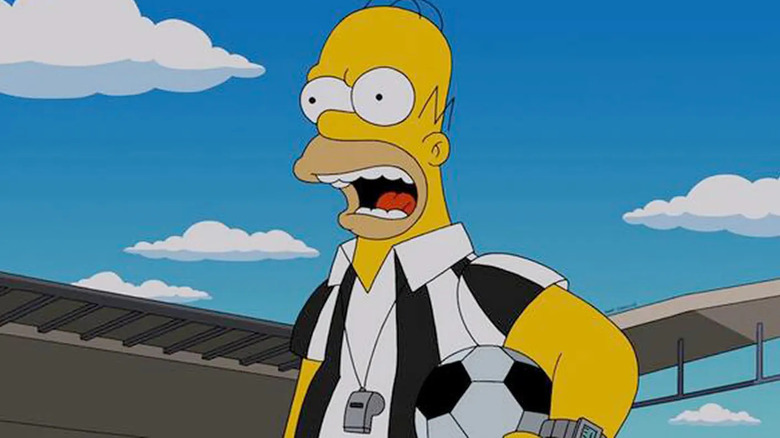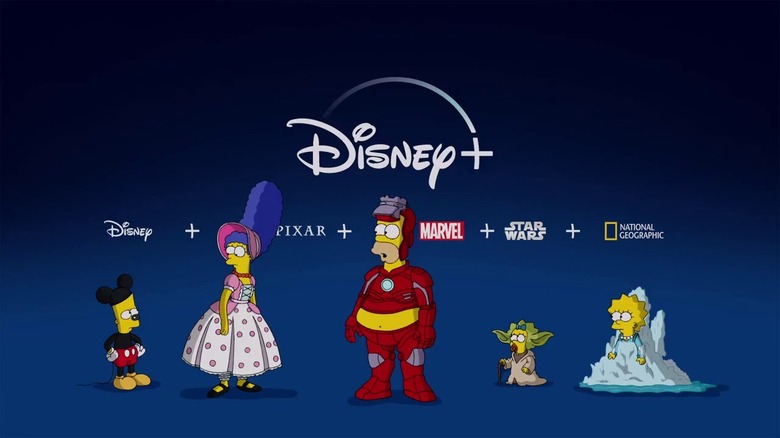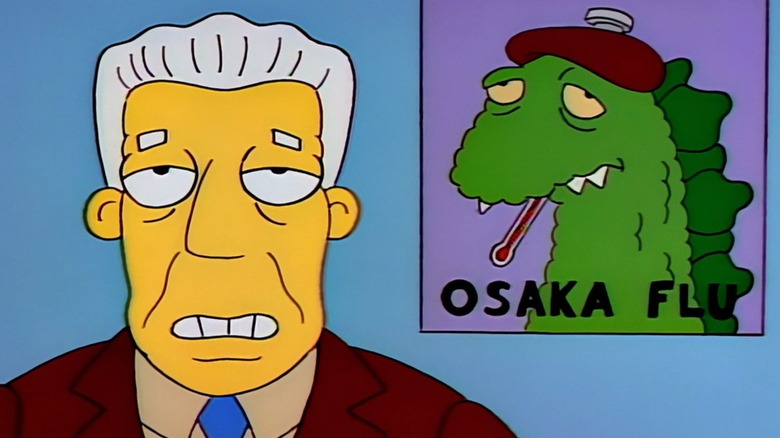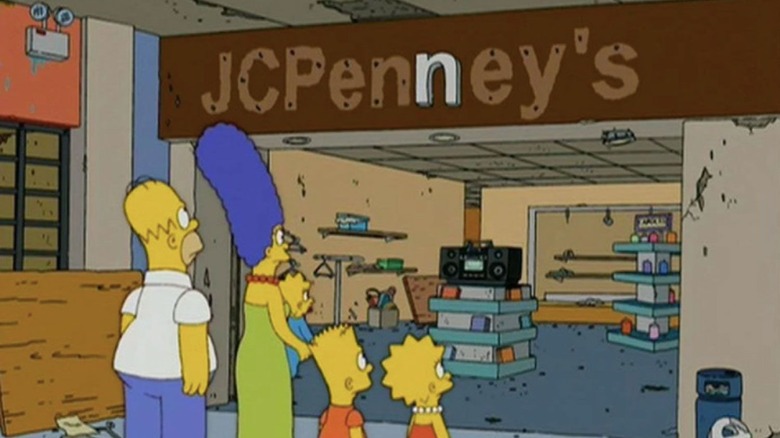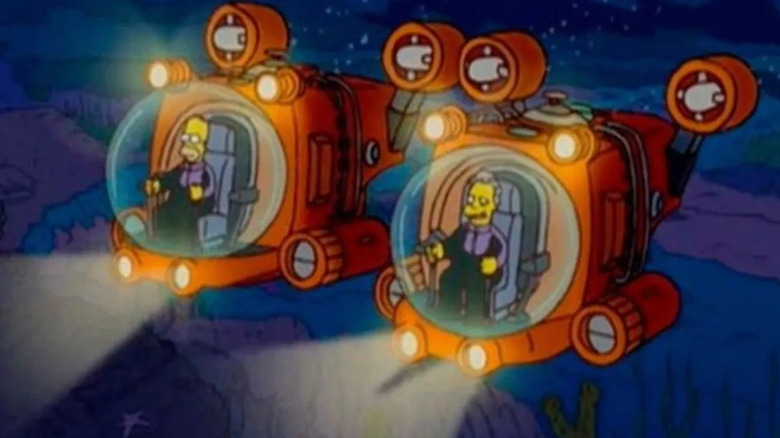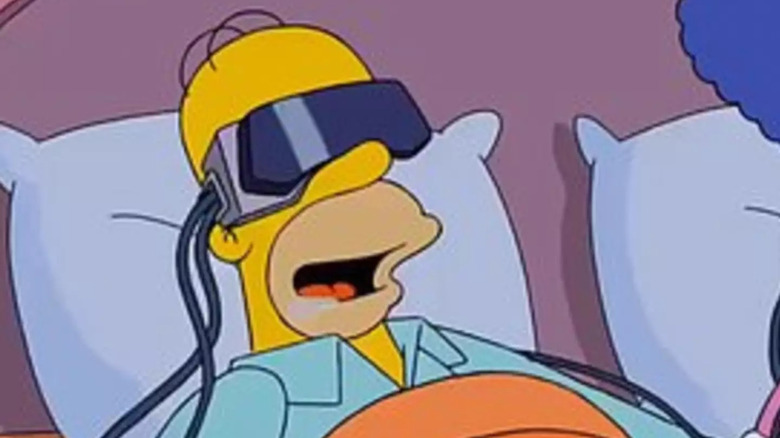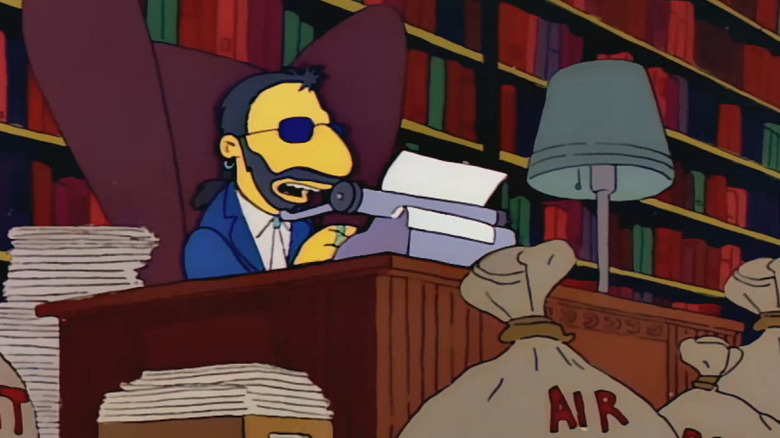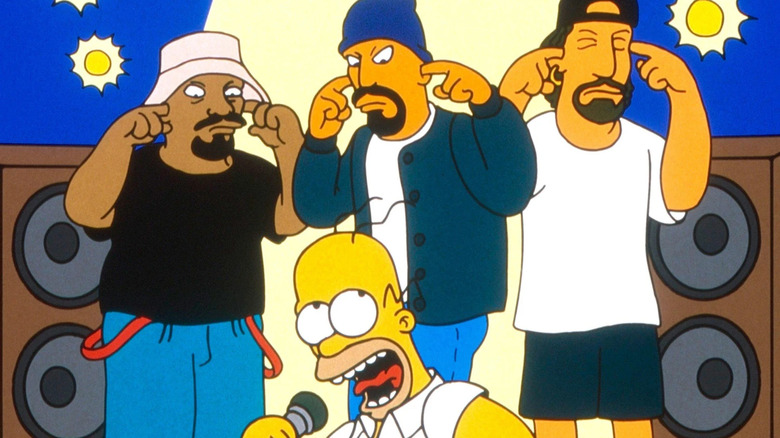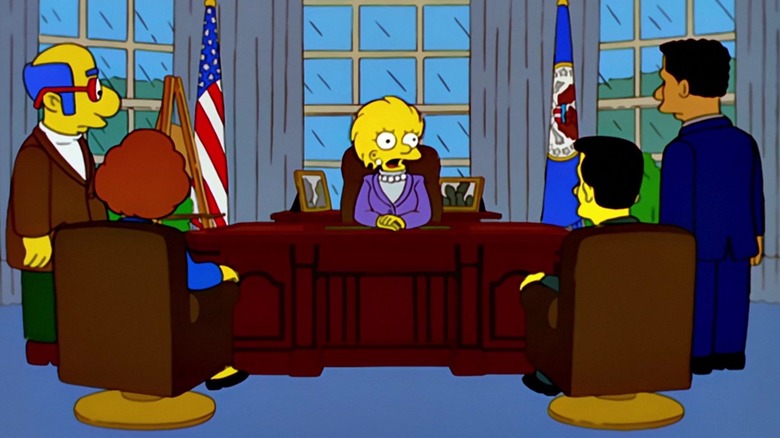Times The Simpsons Freakishly Predicted The Future
After being on the air for 35 years and producing more than 750 episodes, there really aren't many things that haven't been made fun of by "The Simpsons." The show's razor-sharp satire has taken aim at politicians, American life, human behavior, big business, parenting, education, pop culture, science, and more — and with such accuracy that it's even been able to predict the future from time to time. In fact, the show has become well known for its prescience. Here are some occasions when "The Simpsons" seemingly knew what was going to happen before the rest of us.
The Simpsons told us about President Trump
On a future-set episode of "The Simpsons" that aired in 2000, we learn that Bart is a broke bar musician doing Jimmy Buffett ripoffs and living with Ralph Wiggum. He makes big plans to mooch off his sister, Lisa, who has just been elected President of the United States. In her first cabinet meeting, President Simpson mentions that her administration has "inherited quite a budget crunch from President Trump." While a first name is never given, one can assume she's referring to Donald Trump, who twice became the President of the United States. (Which means Lisa Simpson is up next.)
All-you-can-eat is a lie!
In "New Kid on the Block," a 1992 episode of "The Simpsons" written by Conan O'Brien, Homer sees a TV commercial for an all-you-can-eat seafood restaurant called the Frying Dutchman. (It's the first appearance of the Sea Captain.) Homer goes and proceeds to eat until closing, and is then kicked out...while still hungry. He then sues the restaurant for false advertising, and Homer and the Sea Captain come to an agreement: He can shove gobs and gobs of fried fish down his craw if he does it in The Frying Dutchman's window under a sign labeling him "Bottomless Pete: Nature's Cruelest Mistake," so as to draw more customers.
In 2012, Bill Wisth went to a Mequon, Wisconsin, restaurant called Chuck's Place for its weekly Friday night fish fry buffet. After a few trips, he wanted more, but the restaurant claimed they'd run out. Wisth refused to pay and planned on picketing Chuck's Place, telling reporters, "If the people who run the restaurant put up signs that say all you can eat, but then selectively not want to fill that promise, that's false advertising." The owner of Chuck's Place claimed Wisth had eaten more than 20 pieces of fish and was violating the buffet's "no sharing" policy.
The Isotopes move to Albuquerque
The 2001 episode "Hungry, Hungry Homer" concerns Homer going on a hunger strike to prevent the local minor league baseball team, the Springfield Isotopes, from secretly moving to Albuquerque. In 2002, the minor league Calgary Cannons announced a move to Albuquerque, and the local paper published a poll asking readers to come up with a new name for the team. The Isotopes overwhelmingly won with 67 percent of the vote. While they admit they got the idea from "The Simpsons," "Isotopes" is an appropriate fit for a team from that area, as New Mexico is near the site of many nuclear facilities, most notably the Los Alamos National Laboratory.
Don't bet on insurance
The 1996 episode "Hurricane Neddy" is all about Ned Flanders' spiritual and mental breakdown. A hurricane hits Springfield — specifically Ned's house, reducing it to rubble. The people of Springfield come together to rebuild it for Ned, because he's such a great guy... and, as his wife Maude remarks, they had no homeowners' insurance to cover the damage because Ned equated insurance with gambling. Several years later, the Darul Uloom Seminary of Deoband, an influential institution for the Sunni Muslim community of India, issued a fatwa, or edict, that decreed buying life insurance was — you guessed it — akin to gambling.
People unknowingly ate gym mats (kind of)
Over the course of the show's run, there have been many scenes depicting the cost-cutting and utterly disgusting measures by which Lunchlady Doris will go to feed the children of Springfield Elementary. But she has her limits. In the 1995 episode "The PTA Disbands," Doris keeps using shredded newspaper and old gym mats as recipe ingredients, even though "there's very little meat in these gym mats." In 2014, a minor but disgusting scandal developed when the Environmental Working Group released a report that found a compound called azodicarbonamide in around 500 processed food products, primarily breads, including Wonder Bread, Pillsbury Dinner Rolls, and the bread they use to make sandwiches at Subway. What's so bad or surprising about that? The chemical is a filler that makes bread — and yoga mats — soft.
Uncle Herb's baby translator was made for real
In an early episode of "The Simpsons," Homer meets his long-lost brother Herb, but then leaves him in financial ruin after he bets his whole car manufacturing business on a ridiculous car Homer designs. Left destitute, he moves in with the Simpsons, and gets rich again when, with Maggie's help, he creates and markets a baby translator that turns an infant's cries and sounds into English. As Marge says in the episode, "every mother in the world" would want one — and in the mid-2000s, Japanese high-tech company Takara developed a real-life prototype that analyzed a baby's sounds along with its facial expression and body temperature to alert parents that the baby was hungry, tired, or needed to go to the bathroom, among other needs.
The show clothed a naked masterpiece
In 1990's "Itchy & Scratchy & Marge," Marge goes on a crusade to clean up cartoons via censorship. She abandons the cause after her fellow crusaders move to cover up Michelangelo's David when the Renaissance masterpiece visits a museum in Springfield. In 2001, a Florida shop called Fountain and Falls placed a small replica of David outside its front door. Never mind that it was a masterpiece — the statue is anatomically correct. The owner of a barber shop nearby complained to city hall about it. "I didn't even know it was art," said Jeanne Johnson. "To me, it's just a naked man standing on the side of the road." City officials asked the owner of Fountain and Falls to cover the statue's crotch with a loincloth, and, while not legally obliged to do so, he agreed.
Homer's theory of a donut-shaped universe was seemingly correct
At the end of "They Saved Lisa's Brain," a 1999 episode of "The Simpsons" in which Lisa and her local MENSA chapter attempt to rule Springfield with their superior intellect, the smartest guy in the world makes a cameo: Stephen Hawking, the famous physicist and cosmologist. Hawking (who died in 2018) remarks to Homer, "Your theory of a donut-shaped universe is intriguing. I may have to steal it." In scientific parlance, "donut-shaped" is torus shaped. And yes, as it turns out, the universe may actually be torus-shaped. Years after Homer Simpson "proposed" the theory, cosmologists noticed radiation patterns in space suggesting that the universe was round and tube-like, but "empty" in the middle. Mmmm... space donut.
A lemon tree was stolen in real life, too
The kids of Springfield have a grand adventure with rival town Shelbyville in "Lemon of Troy," a 1995 episode about efforts to recover the town's beloved lemon tree, planted by settlers long, long ago. Those villains from Shelbyville ripped it right out of the ground! Who steals a lemon tree? The idea is absurd! Hanna Cook-Wallace of Madison, Wisconsin, would agree, though the story happened to her. In the summer of 2011, the huge Meyer lemon tree she kept in a planter on her front porch for 20 years was stolen. "It's bizarre," Cook-Wallace told reporters.
Homer's life was saved by the man he mocked
In the 1997 episode "Homer's Phobia," the Simpsons befriend a kitsch shop owner named John (voiced by director John Waters). Homer loves the guy... until he finds out he's homosexual. Eventually, Homer gets over his fear and distrust of John when John is the bigger man and saves Homer from being gored to death by a bunch of reindeer. "Homer, I won your respect, and all I had to do was save your life," John says. "Now, if every gay man could just do the same, you'd be set." A very similar lesson was learned by Baljit Koonar in 2010.
Koonar's home in Birmingham, England, was next door to Bryn and James Tudor, who in 2005 became the first same-gender couple in the city to obtain a civil partnership. Koonar publicly harassed and terrorized the couple... until they saved his life. Koonar's house was on fire early one morning, and the smell of smoke awakened James Tudor, who got Koonar and his family away from the house to safety.
A throwaway gag predicted the hit game FarmVille
While attending Colonel Tex's Traveling Carnival in the 1998 episode "Bart Carny," the kids of Springfield are transfixed by a cutting-edge virtual reality game that allows them to... pretend they're doing yard work, such as trimming hedges and raking leaves. It seemed utterly bizarre at the time, but this was a different era of games: Some of the most popular titles from 1998 include "Half-Life," "Metal Gear Solid," "Banjo-Kazooie," and "The Legend of Zelda: Ocarina of Time." Had this episode dropped in 2009, however, it wouldn't have seemed as odd. This was the year that Zynga's strikingly similar Facebook-based game FarmVille came out, racking up more than $1 billion in in-game purchases. "The Simpsons" seemed to predict the direction of gaming in this classic episode.
Homer determined the weight of the Higgs boson
While first proposed in 1964, it wasn't until 2013 that physicists discovered the Higgs boson, the field (and particle by which it could be detected) that basically holds atoms together — in other words, the very fabric of existence, and a key to understanding how the universe and matter work. Oddly enough, Homer Simpson, of all people, predicted the discovery of the Higgs boson. In a 1998 episode of "The Simpsons" called "The Wizard of Evergreen Terrace," Homer attempts to become a scientist and inventor, and is seen messing around with some formulas on a chalkboard. Believe it or not, his math actually gets pretty close to the one that determines the molecular weight of the Higgs particle.
Lady Gaga's Super Bowl halftime show
Lady Gaga played the halftime show of the 2017 Super Bowl, delivering a spectacular performance that will be remembered for a long time. It included high-wire stunts, pyrotechnics, theatrical costumes... and other elements that closely mirror the performance of an animated Gaga on a 2012 episode of "The Simpsons." In "Lisa Goes Gaga," the pop star comes to Springfield for a concert and soars over the crowd in a harness while wearing an outfit (and knee-high boots) similar to the ones she eventually wore during the real-life Super Bowl.
Disney buying Fox
"The Simpsons" began life as a segment on "The Tracey Ullman Show" back in 1987, one of the Fox network's first shows. That means the yellow-hued family has been a staple of the network since the beginning, and as such frequently pokes fun at its corporate overlords. The 1998 episode "When You Dish Upon a Star" found Homer working as a very annoying personal assistant to then-married couple Alec Baldwin and Kim Basinger (voicing themselves).
The installment cracked numerous jokes at the expense of celebrities and Hollywood in general, allowing them to slip in a joke about Fox's business practices. There's a brief shot of the entrance to the 20th Century Fox lot, which a sign says is also "A Division of Walt Disney Co." Nearly two decades later, the Walt Disney Company bought out competitor 21st Century Fox for a cool $71.3 billion. Disney now owns Fox ... and "The Simpsons."
Team USA winning a gold medal in curling
Curling — a unique sport that involves the careful pushing and sweeping of a large "stone" into a circle on an ice rink — has been a regular event at the Winter Olympics since 1998. And in that time, teams from cold, snowy countries like Canada, Sweden, and Switzerland dominated the medal count. Team USA reached the medal podium only once, when the men's team won bronze in 2006.
The near lack of American presence in the sport added an extra air of improbability to the 2010 Olympics-themed "Simpsons" episode "Boy Meets Curl," in which Homer and Marge become a mixed doubles curling duo for Team USA. They wind up winning the gold medal, an achievement matched by the real American curling team in 2018. (Even weirder about this "Simpsons" prediction: The show predicted mixed doubles curling being an Olympic event in the first place. It wasn't part of the Winter Games until 2018, eight years after "Boy Meets Curl" first aired.)
The Simpsons added the Shard to London's skyline
The 1995 "Simpsons" episode "Lisa's Wedding" is the first of many set in the future. This one takes place in the far-off year of ... 2010. Lisa, 23 years old and attending college, falls in love with a charming British man named Hugh (voiced by Mandy Patinkin), and they decide to get married. There's a lot of future-now-current technology on display in this installment. Lisa tells Marge of her big news via a Skype-like video call, while other characters wear wrist computers which resemble the Apple Watch. But video phones and two-way wrist communicators are old tropes for stories set in the "future." The truly eerie prophecy from "Lisa's Wedding" is the prediction of a new building on the London skyline.
When Lisa flies to England to meet her new potential in-laws, viewers get a glimpse of the updated London skyline — Big Ben has gone digital (and flashing "12:00") while a narrow, spire-oriented building stands out in the distance. It looks remarkably like a narrow, spire-oriented skyscraper called The Shard, an edifice that wasn't even proposed until the year 2000. It was 2013 by the time it was complete, almost two decades after "Lisa's Wedding" aired.
Fat Tony's ferret fiasco
Recurring mob boss character Fat Tony has been at the center of several memorable storylines over the years. He's been involved in a number of shady activities, including illegal gambling, running cigarettes and rum, selling fake milk ("malk," fortified with "Vitamin R") to schools, and offering extortion-style "protection" to Marge's pretzel business. The 2002 episode "Poppa's Got a Brand New Badge" involved one of the mobster's weirdest schemes ever.
In this episode, Homer's security company SpringShield busts Fat Tony gluing cotton balls onto ferrets, with plans to sell them to a pet store by passing them off as far more expensive toy poodles. It's a weird scheme ... and similar to one a real-life criminal actually attempted in 2013. According to the Daily Mail, a retiree visited the massive La Salada outdoor bazaar in Buenos Aires, Argentina, and purchased two poodles. He took his new pets to a veterinarian for a checkup, only for the vet to discover that they weren't poodles at all: They were ferrets given steroids to appear poodle-size.
The Simpsons predicted a bloody billboard for Kill Bill
Bart and Lisa love "The Itchy & Scratchy Show," the cartoon segment on "The Krusty the Clown Show" featuring the unspeakably violent and amazingly gory antics of a Tom & Jerry-parodying cat and mouse. In the 1992 "Simpsons" episode "Itchy and Scratchy: the Movie," the promoters of the duo's feature film have to pull out all the stops, so they install a billboard in Springfield showing Itchy (the mouse) using a movie camera to chop off the head of Scratchy (the cat). Blood (or presumably fake blood) spews out of the billboard with every chop, to the delight of drivers below who get splattered with the stuff.
When Quentin Tarantino's "Kill Bill: Vol. 1" (a work almost as violent as "The Itchy & Scratchy Show") debuted on TV in New Zealand in 2008, network TV2 contracted advertising firm Saatchi & Saatchi to inform the public. It did so with a billboard-meets-art-installation in which Uma Thurman's character The Bride held a katana that unleashed so much blood, it exploded beyond the printed panels and onto the side of a building, all over the street, and the white cars parked below. "A state-run television station paid for this tangible bloody mess of an installation, complete with prop cars strewn around one of the busiest intersections in Auckland," said Vice.
A tragic attack during an animal act
In the early 1990s, Siegfried and Roy were staples of the Las Vegas entertainment scene. The German-American duo put on a show that was one part magical spectacle and one part animal act, involving beautiful white lions and white tigers. The "Simpsons" characters of Gunter and Ernst are obvious parodies of the real world entertainers. In the 1993 episode "$pringfield (or, How I Learned to Stop Worrying and Love Legalized Gambling)," they come to Springfield to perform in Mr. Burns' casino, along with their white tiger, Anastasia.
In their stage show, viewers see Anastasia humiliated as she wears a dumb hat and rides a unicycle. The tiger then dreams about her old life in the jungle, which ended when Gunter and Ernst shot her with a tranquilizer dart. She then snaps back to reality and, full of rage, attacks Gunter and Ernst, ripping them to shreds. Horrifically, the actual Roy Horn suffered a very similar traumatic event. During a 2003 show at the Mirage in Las Vegas, a seven-year-old, 300-pound white tiger bit and mauled Horn, sending the performer to a hospital's trauma unit. Horn was able to walk again, albeit with assistance, five months later.
Bengt Holmstrom wins a Nobel Prize
The 2010 episode "Elementary School Musical" begins with Lisa and her friends watching the announcement of that year's batch of Nobel Prize winners. As Lisa and her friends — Martin, Milhouse, and Database — are just a little bit nerdy, they've all made predictions and printed them out. The writers of "The Simpsons" really do their research, aiming to get the details just right for even the briefest and most esoteric of sight gags.
The friend group's little chart lists 20 possible Nobel winners across five categories, and all of them are real people and outstanding members of their field, including Vera Rubin (Physics), Richard Zare (Chemistry), Umberto Eco (Literature), and Piedad Córdoba (Peace). Milhouse's pick to take home the big prize in Economics: Bengt R. Holmstrom, a Finnish economist and MIT faculty member. Amazingly, the usually hapless Milhouse got it right: Holmstrom really did win the Nobel Prize for Economics in 2016.
Electronic voting machines controversy
"Treehouse of Horror" is one of the most beloved traditions in "The Simpsons" history — even though these horrors can sometimes be a little too real for comfort. In "Treehouse of Horror XIX" (which was a part of the show's 20th season, airing in the heat of the 2008 U.S. Presidential Election), a gag sees Homer attempt to vote numerous times for then-Democratic nominee Barack Obama via an electronic voting machine, only for his vote to be automatically swapped for the late Republican nominee John McCain. He's ultimately sucked inside the machine and killed so he can't tell anyone about what he's discovered.
While most Americans are probably exhausted from hearing unfounded complaints about voting machines stealing elections, there was actually one instance of something like this happening where President Obama's name was automatically filtered by a voting machine. In 2012, a voting machine in Pennsylvania had to be taken back to maintenance after one user found it was erroneously recording votes for President Obama as votes for Republican presidential nominee Mitt Romney. There seemed to be a problem with the machine's touch screen calibration, causing it to register touch commands in the wrong location.
An outbreak of the Ebola virus
Here's where we set the record straight on a more popular prediction from "The Simpsons." It's been said that in Season 9, Episode 3, "Lisa's Sax" (originally aired in 1997), the series was somehow able to predict the existence of the Ebola virus before it was publicly known. This is simply not true — but the episode does deserve some credit for being ahead of the curve, as it includes a scene where Marge reads from a book called "Curious George and the Ebola Virus." Though it had yet to enter the wider American consciousness, it had been discussed in 1994 thanks to author Richard Preston's book "The Hot Zone," based on his New Yorker article from two years prior.
Given that many "Simpsons" writers in early seasons were Harvard University academics, it isn't all that hard to imagine at least one of them had a subscription to the above magazine, or were otherwise aware of it when general audiences weren't. Nevertheless, none of this takes away from how eerie it was for "Simpsons" fans when the virus did finally come to America in 2014. Given how shocking it was that Ebola was in the United States in the first place, it makes sense that the memory of Marge's book would stick out as another example of the show predicting the future.
NSA spying controversy
In 2013, whistleblower and former NSA employee Edward Snowden leaked evidence to the public that the NSA was using a loophole in the law to spy on ordinary American citizens. According to Snowden, NSA analysts were reading the emails of former romantic partners, for example. As the American Civil Liberties Union (which filed a constitutional lawsuit in federal court following Snowden's revelations) put it: "Section 702 of the Foreign Intelligence Surveillance Act permits the U.S. government to engage in mass, warrantless surveillance of Americans' international communications, including phone calls, texts, emails, social media messages, and web browsing."
The details of the scandal are well-known today, but back when "The Simpsons Movie" dropped in 2007, most people were totally unaware that the authorities were able to access their private info. That's why it's so shocking that the film predicted this. When Springfield is quarantined and the Simpsons go on the run, Marge voices her concern that anyone could be listening to their phone calls. We then cut to a room full of NSA agents, who are seen listening to all manner of normal people. When one agent manages to hone in on the Simpsons, they say: "Hey everybody, I found one! The government actually found someone we're looking for! Yeah, baby, yeah!"
The FIFA corruption scandal
In some ways, it's more impressive when "The Simpsons" is able to pre-empt a shocking world event by a matter of months rather than decades, as was the case with the FIFA corruption scandal. In Season 25, Episode 16, Homer is suddenly considered a viable soccer referee by FIFA due to its recently tarnished reputation in the universe of the show. Just a few months after this episode was released, this tarnished reputation would become the organization's reality. In May 2015, seven FIFA officials were alleged to have taken over $150 million in bribes over the course of more than two decades.
Like a few other entries on this list, a likely explanation for "The Simpsons" being able to "predict" this event comes down to the writers potentially being more aware of the controversies surrounding the organization before they reached a peak and entered the public consciousness. For example, one earlier incident that could have caught their attention was the 2012 revelation that FIFA President João Havelange took millions of dollars worth of bribes during his term. And, as an added bonus, the episode also predicted that Germany would be the next winner of the World Cup.
The Mandalorian and Baby Yoda
"The Mandalorian" was a game-changer for Disney and Lucasfilm when it dropped in 2019, taking the franchise in a new direction reminiscent of classic Westerns. This savvy shift in tone and focus was actually predicted by "The Simpsons" many years earlier. In Season 15, Episode 15, "Co-Dependent's Day" (released in 2004, when "Star Wars" fans were already two-thirds of the way through the disappointing prequel trilogy), the Simpson family head out to the movies to watch "Cosmic Wars: The Gathering Shadow," a disappointing entry in an otherwise beloved sci-fi franchise.
Eventually, Bart and Lisa get to meet the franchise's founder, Randall Curtis — a not-so-subtle stand-in for "Star Wars" creator George Lucas. At the end of their conversation, Randall embarks on a journey to rediscover what made "Cosmic Wars" great. In his words, this includes "plots and characters lifted from westerns and samurai films." And if this wasn't impressive enough, "The Simpsons" also unintentionally "spoiled" the existence of Baby Yoda (later named Grogu) ahead of "The Mandalorian." A promo for the Disney+ app shows the Simpsons dressed as various characters, with little Maggie Simpson as Yoda.
A pandemic with bees at the same time
As far as plots for zany animated sitcoms go, a pandemic isn't that far out of left field to be counted as a prediction in and of itself — even if we did eventually get a real, world-changing pandemic in 2020, the effects of which are still felt to this day. But where "The Simpsons" gets really strange is how it depicts a Springfield overrun not just by a dangerous illness, but by killer bees as well.
In Season 4, Episode 21, "Marge in Chains" (which originally aired in 1993), a virus known as the "Osaka Flu" comes to Springfield, causing chaos as the town's citizens try haplessly to protect themselves from it. During this chaos, they knock over a truck they believe to be transporting a cure — instead, it's transporting killer bees, which then spread throughout the town as well, exacerbating the panic.
In the real world, a species of two-inch long bee (known as the "Asian giant hornet" or, more colloquially-slash-dramatically, the "murder hornet") made it to America at the height of the pandemic. Though these bees weren't necessarily deadly to humans, they did have the potential to decimate honey bee habitats, and they certainly caused widespread panic, just as the bees of Springfield did on "The Simpsons."
JCPenney goes bankrupt
In "The Simpsons" Season 18, Episode 3, "Please Homer, Don't Hammer 'Em" (which originally aired in 2006), the family go to a rundown mall. While the story only spends a few scenes in the dilapidated environment (perhaps itself a harbinger of the dead malls that would only grow in number as online shopping became more prominent), the Simpson family notably stops by an empty JCPenney storefront, abandoned and left to rot. This image returned to the minds of fans with full force in 2020, when JCPenney filed for Chapter 11 bankruptcy.
Of course, a major factor in this decision was the COVID-19 pandemic, which forced businesses across the world to close. The company has since been trying to lower its financial liabilities and restructure its business model so that it can emerge from bankruptcy once more as a retail option for families affected by inflation. The company is even spending a significant amount of cash on remodeling stores, hopefully leaving them in a better state than the one seen at the Springfield Mall.
The OceanGate Titan submersible disaster
Social media users across the globe were captivated by the story of OceanGate's Titan submersible in 2023. The aquatic vehicle was lost at sea after it attempted to descend to the wreck of the Titanic. After debris was discovered, it was determined that the sub had suffered a catastrophic implosion that tragically took the lives of all aboard. In the midst of the media frenzy, many "Simpsons" fans began sharing clips from Season 17, Episode 10, "Homer's Paternity Coot," which aired in 2006. The episode features a moment where Homer gets lost while exploring a shipwreck and piloting a submersible similar in design to the Titan.
The obvious explanation for this prediction is that, in a show as long-running as "The Simpsons," a submarine plot was bound to happen at some point. However, what makes this particular coincidence fascinating is that "Simpsons" writer and producer Mike Reiss was actually a passenger on an OceanGate submersible during a previous voyage, having paid the $100,000 fee to catch a glimpse of the Titanic. According to Reiss, there were technical issues on his journey. "Death is always lurking, it's always in the back of your mind," he said when asked about the trip by the New York Post. "Before you even get on the boat, there's a long, long waiver that mentions death three times on page one."
VR headsets hit Springfield
On the surface, the Apple Vision Pro is like many virtual reality headsets that came before it. The main feature is the ability to strap an interactive screen to your face so as to immerse yourself more completely in whatever game you're playing or movie you're watching. From that point of view, there's nothing special about "The Simpsons" predicting a VR headset being widely adopted in Season 28, Episode 2, "Friends and Family" (which aired in 2016). What makes it noteworthy, however, is how it correctly predicted how the Vision Pro would stand out from the crowd.
Apple's popular VR headset comes with a travel mode. This was meant primarily for planes, but some users took to using it while out and about in public, which annoyed a lot of people. Writing about the phenomenon for CNet, tech reporter Scott Stein said: "Please, please, stop doing this. Please." As antisocial as strapping a screen to one's face might seem, the intent is apparently for them to be adopted like eyewear. In "The Simpsons," the town of Springfield almost unanimously adopts VR headsets in the same way, with residents stumbling into light poles and traffic because of their obscured vision.
A Beatles member replies to fan mail decades late
In 2024, legendary musician and former Beatles member Paul McCartney responded to a fan six decades after she initially reached out. When the British group first "invaded" America in 1963, a Brooklyn woman named Adrienne spoke to McCartney through a reporter and professed her unmatched admiration for the artist. Six decades later, when he was opening a photo gallery at the Brooklyn Museum filled with hundreds of pictures he captured around that time, he invited Adrienne to the show via his Instagram page. McCartney had done something similar a decade earlier when he belatedly responded to a tape recording sent by two Essex women in 1963.
Long before McCartney sent those long overdue responses, Ringo Starr responded to his own piece of decades-old fan mail from Marge Simpson. In "The Simpsons" Season 2, Episode 18, "Brush with Greatness" (which aired in 1991), a fictional version of the character (voiced by Starr himself) helps Marge rediscover her love for art by finally writing to her to let her know he loved a painting she did of him twenty years prior. In 2008, Starr politely asked fans to stop sending him mail, giving people a firm cut-off date. "Nothing will be signed after the 20th of October," he said (via Smooth Radio). "It's gonna be tossed. I'm warning you — with peace and love — I have too much to do."
Cypress Hill plays with the London Symphony Orchestra
Does something count as a prediction if it inspired people to recreate something that otherwise wouldn't exist? That's for you to decide, though we think "The Simpsons" deserves some credit for proposing a collaboration that no one else — not even those involved — had thought of before them. In Season 7, Episode 24, "Homerpalooza" (which originally aired in 1996), American hip hop group Cypress Hill find themselves unexpectedly performing with the London Symphony Orchestra. Almost thirty years later, the real Cypress Hill hooked up with the LSO for a one-night-only concert, which was largely inspired by the fan reaction to the 1996 episode.
"It's been something that we've talked about for many years since the 'Simpsons' episode first aired," Louis "B-Real" Freese told the BBC in 2024. "So it's very special for us. And it's coming off the heels of our 30th anniversary for our 'Black Sunday' album." The fact that the performance was at the world famous Royal Albert Hall in London made it all the more special for the group. "We've played a lot of historical venues throughout our career and stuff like that, but nothing as prestigious as this." They even invited musician Peter Frampton — also featured in "Homerpalooza" — to join them in their recreation-slash-celebration.
President Lisa wears the same outfit as Vice President Kamala Harris
The most recent example of "The Simpsons" getting the future just a little too right comes from Season 11, Episode 17, "Bart to the Future," which originally aired in 2000. In the episode, Bart is given a vision of what his life in Springfield will be like 40 years into the future. As part of this journey, he learns that his sister Lisa will one day become the President of the United States of America — a moment already famous among "Simpsons" predictions for an off-hand joke that foresaw Donald Trump becoming president one day himself.
President Joe Biden formally declined the nomination of the Democratic Party in July 2024. Thereafter, he and many other prominent Democratic politicians endorsed Vice President Kamala Harris as the party nominee. In the episode, Lisa wears an outfit nearly identical to the one Vice President Harris wore at President Biden's inauguration in 2021. Writer Al Jean (who penned this now infamous episode) described himself as "proud" of the prediction in a post on X (formerly Twitter).
